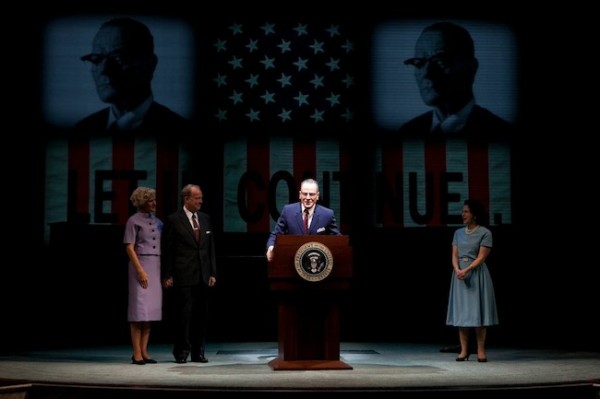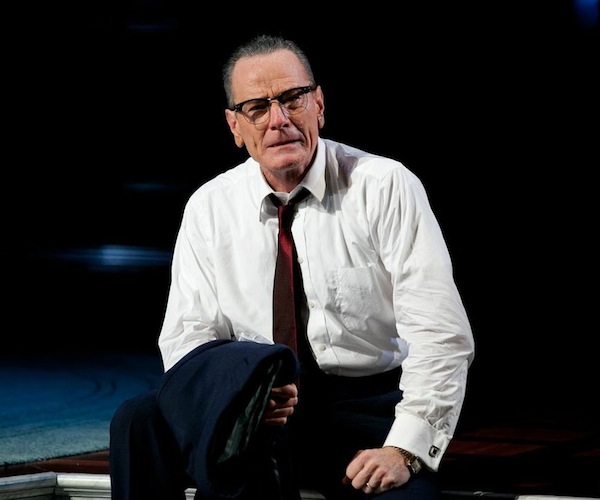Fuse Theater Review: Not Quite “All The Way”
Pulitzer prize-winning dramatist Robert Schenkkan is chained to a dreary, fact-driven approach in “All the Way,” tossing in bits and pieces of “what if” for unconvincing dramatic effect.
All the Way, by Robert Schenkkan. Directed by Bill Rauch. Staged by the American Repertory Theater at the Loeb Drama Center, Cambridge, MA, though October 12.

Susannah Schulman, Reed Birney, Bryan Cranston, Betsy Aidem in ALL THE WAY at the American Repertory Theater. Photo: American Repertory Theater/ Evgenia Eliseeva.
By Bill Marx
The one-white-man-band vision of American power proffered in the docu-u-drama All the Way makes a warped kind of political and commercial sense. Its vision of presidential bullying will no doubt please those pining for arm-twisting during these days of ideological deadlock. It also gives stargazers a chance to watch the fine actor Bryan Cranston dominate the evening in the plum role of Lyndon Baines Johnson. His is a show-offish performance in the service of dramatizing an unapologetically imperial presidency. Cranston is charming, commanding, cajoling, and cantankerous – but he never manages to be vulnerable or devilish. Partly this is because the play sticks pretty close to the angelic side of Johnson, his efforts to pass the Civil Rights Act of 1964 before the campaign against Barry Goldwater revs up. Flickers of Vietnam pop up, but the monster writhing in bloody quicksand is yet to come. It is sort of like watching Shakespeare’s Richard III submit feel-good liberal legislation in order to placate the suspicious before the fated hellaciousness kicks in. (I hear there is a second part of this play being developed — hard not to speculate that it will turn LBJ into a lovable but tragic American character.)
Shakespeare was wise enough to include strong supporting characters to stand up against his charismatic megalomaniac. And he believed in treating history with a huge dose of imagination, serving up a grander vision than a blow-by-blow chronicle. Pulitzer prize-winning dramatist Robert Schenkkan is chained to a dreary, fact-driven approach, tossing in bits and pieces of “what if” for unconvincing dramatic effect. His Johnson is afflicted by cyphers, gophers, and politicos who flicker in and out of view, either spouting explanations so the audience can follow the conniving maneuvers of the powerful or setting themselves up as straws for Johnson to bluster into quick submission. There is no counterforce to Johnson’s folksy hammer blows – he is a giant kicking pygmies out of his way. To Schenkkan’s credit, he squeezes an enormous amount of information into his scenes, with characters pushing the plot along while telling the audience exactly what is going on, from the way Johnson outfoxes the racist Southern forces in the Congress to how he pressures Martin Luther King to play along with him at the Democratic Convention. We are spoon fed realpolitik.
The upshot is that the hand-holding gives All the Way the dutiful air of a flavorless PSA, a canned “You-Are-There” history lesson. Nothing will be of any surprise to those familiar with the period: Martin Luther King is having affairs while being wired-tapped by J. Edgar Hoover and the FBI, Hoover blackmails Johnson in order to remain in power, politics is a dirty business where allies and old friends must be sacrificed, personality rules, and winning is damned well everything. (For some reason, Schenkkan leaves out the notorious “Daisy” TV advertisement, a prophetic exercise in spreading hysteria that sealed the deal for LBJ’s reelection.) There is nothing here about the way things run in Washington, D.C., that a three minute “Deep Dive” segment on MSNBC wouldn’t tell you.
I found Bill Rauch during his Harvard years to be a talented director who often found innovative ways to make theater a part of the community, his productions distinguished by a funky yen to yank the classics into the multicultural/multi-class present. There is nothing in his staging here that reminds me of this approach, little that goes beyond the smoothly economical: he moves actors around with clockwork efficiency, letting nothing get in the way of the production’s clarity. The focus is kept on Cranston (whose LBJ is feasible in look and sound), while the cast members scamper about as if they fear they are taking precious time away from the lead, though Michael McKean brings some welcome deadpan comedy to his portrait of J. Edgar Hoover.

Bryan Cranston as LBJ in ALL THE WAY at the American Repertory Theater. Photo: American Repertory Theater/ Evgenia Eliseeva.
All the Way doesn’t add very much to our understanding of the Johnson years or the fight for Civil Rights (any number of documentaries do a much better job). What the production does do is nail down that the sixties have become one of the sweet spots for the Broadway-minded commercial entertainment that is being generated by the American Repertory Theater and other major regional stages around the country. Yes, a big star at the helm is desirable. (Would All the Way be sold out if a celebrity such as Cranston wasn’t in it?) But that is old news. It turns out the sixties are box office gold — it is the place where ambitious theater companies and interminable PBS fundraisers, grand sounding artistic visions and marketing strategies, meet. Lawrence Welk is out — The Rascals are in.
For example, note A.R.T Artistic Director Diane Paulus’s New York success with such ersatz-counterculture shows as Pippin and Hair. The Jungle Book, currently running at Boston’s Huntington Theater Company after its premiere at the Goodman Theater in Chicago, also has a foot deep in the sixties — this Broadway-bound musical adaptation of Kipling comes via the popular 1967 Disney cartoon version. I heard from a friend recently that the sixties have become a hot era for antique buyers. For the mainstream arts, demographics are destiny: the sixties has become prime nostalgic merchandise that aging Boomer theater audiences want to experience or own. (New Rep is going to mount a production of the musical Camelot later this season.)
But from what I can tell, the sixties are coming back shorn of their radicalism and progressive edge. Hair and Pippin (see my review for The Arts Fuse) package the counterculture for the sake of safe, reactionary pleasures. Women are slotted as curvy sidekicks or domestic goddesses; All the Way treats Lady Bird and Coretta Scott King as appendages. The ultra-magnetic LBJ demands his female secretaries come with meat on their bones and relishes telling risque yarns (castration is a big theme). Tired businessmen in the audience can sit back and relax with grins during this tour of the beginning of The Great Society — apparently, it was a time when white men didn’t have to be defensive about having the whip hand and women sat without protest on the sidelines. Chortling about tits and ass is part of the fun. Only the uptight will be embarrassed. LBJ was a Mad Man — welcome to the good old days of entertainment.
Tagged: All the Way, American Repertory Theater, Bill Rauch, Bryan Cranston
